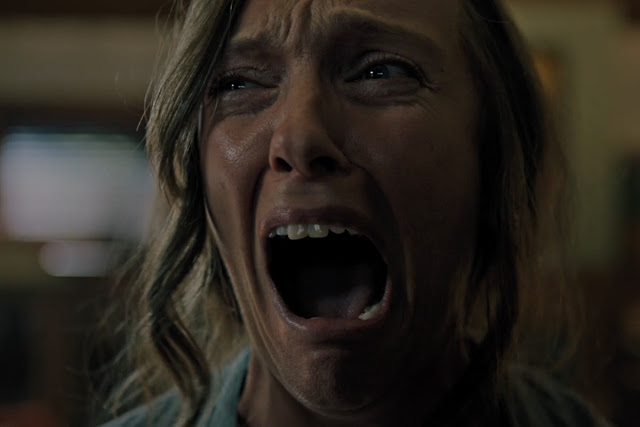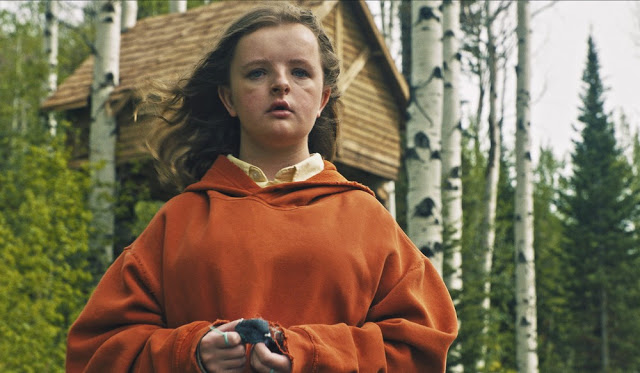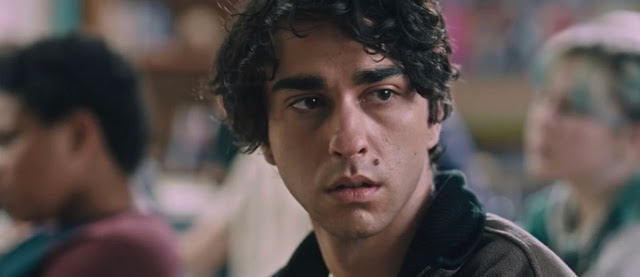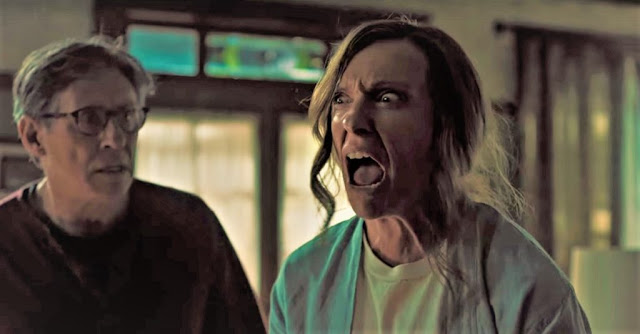She just had to be a miniaturist. Hereditary, the impressive and excessive and frequently electrifying debut feature from Ari Aster, would have been scary enough if its besieged heroine had worked as a lawyer or a teacher or a writer. But no, the recently orphaned Annie (Toni Collette) is a conceptual artist who specializes in designing tiny panoramas, and there’s something extra-creepy about the way she uses paint and glue to manufacture ornately detailed dollhouses. Maybe it’s the notion of a powerful creator exercising absolute dominion over her realm, not unlike a movie director domineering his helpless audience. It seems more than just a fancy flourish that Hereditary opens in an abandoned attic, the camera slowly rotating from a sunlit window to the shadowy interior, then gradually pushing in on one such minuscule dollhouse bedroom; one invisible special effect later, and that facsimile has become the film’s actual environment, with a man striding through the door to wake his son. It soon becomes clear that this movie, with its countless shrieks and shocks, is itself an artfully assembled prison. You cannot escape from it; you can only hold on for dear life, as Aster buffets you where he may.
That may not sound like your idea of a good time, but for cineastes, Hereditary is essential viewing purely as a matter of formal technique. The horror genre is so durable in part because of its mutability—any political point or allegorical tribute achieves more force when appearing in the guise of zombies or ghosts—but it also draws talented craftsmen with an innate command of cinematic grammar. And while Hereditary is not without its flaws—most notably a third-act tilt into absurdity—Aster’s abilities cannot be in dispute. He wields the camera with elegant precision rather than brute force, favoring silky and captivating long takes as opposed to vulgar jump cuts. His directing is always controlled, even when his writing is utterly bonkers.
And Hereditary does eventually go off the rails, succumbing to outré temptations or perhaps just following its carefully charted course to its only logical (by which I mean nonsensical) conclusion. But before all the figurative and literal fireworks—maggot-filled orifices, levitating corpses, enough severed heads to fill 18th-century France—the movie is a masterful exercise in grim, suffocating suspense. An artist who appreciates the value of depth of field, Aster calibrates the frame for maximum spookiness, playing with shadows and light to mess with his characters’ heads and your own. During dark scenes, household objects begin to resemble apparitions, while sinister figures always seem to loom and skulk in the background, shuttling from one gloomy corner to the next. And sonically, the film is a meticulously planned assault, with Colin Stetson’s unnerving score combining with a variety of old-school sound effects, the scariest of which is a simple and repeated cluck of the tongue.
The clucker is Charlie (Milly Shapiro, super-creepy), Annie’s 13-year-old daughter who’s even more maladjusted than your typical sullen middle-schooler; when she isn’t sleeping in the family tree house, Charlie’s sketching grotesque images in a notebook or cutting off birds’ heads with scissors. By the time Hereditary ends, those misbehaviors will seem positively quaint; when it opens, Annie and Charlie are attending a funeral, along with Annie’s husband, Steve (Gabriel Byrne), and their other child, 16-year-old stoner Peter (Alex Wolff, who also played Byrne’s son years ago on In Treatment). The service is for Annie’s mother, whom Annie describes in a clenched eulogy as strong-willed and rather severe. Not like her, right?
Thematically, as its title suggests, Hereditary considers the passage of sins from one generation to the next, and whether our lives—our choices, our flaws, our destinies —are prewritten in our genetic code. Annie plainly disapproved of her mother’s coldness, and she has clearly resolved to treat her own husband and children with greater respect and devotion. This lends a mildly tragic sting to the inevitable disasters that befall her family, beyond the typical blow of watching a mother in pain. Annie’s suffering is terrible enough, but what truly alarms her is the fear that she may be responsible for it. Similar to Essie Davis’ enigmatic mom in The Babadook, Annie is both the frailest and the scariest character in the movie, constantly terrorized by an unholy parade of nightmarish visions that she may be unknowingly perpetrating.
Running 127 unspeakably tense minutes, Hereditary has a lot to say, or at least, it says a lot; the film is perhaps overly burdened with intricate mythological detail and elaborate, obscure plot. To his credit, Aster’s script minimizes scenes of outright verbal explanation, preferring instead to deliver exposition visually, as when Annie frantically hunts through a dusty chest of her mother’s old bric-a-brac and discovers portentous photo albums and freighted literary clippings. And while Aster’s technique is consistently merciless, some of the movie’s most unsettling sequences just involve Annie telling upsetting stories about her past. In one scene at a support group, she reveals the dreadful fates of her father and brother, a ghastly genealogical survey in which seemingly every limb of her family tree has been violently lopped off. Later, when she befriends fellow bereaved mourner Joan (Ann Dowd, great as usual), Annie relays a quiet, terrifying memory of a years-old sleepwalking incident involving her children, a lit match, and a can of paint thinner.
Central to Hereditary’s success is Collette’s deeply committed performance, which pings wildly—from grief to hysteria to wrath and then back round again—but never feels internally inconsistent. She can contort her body like she’s a marionette whose strings are being yanked—a handy talent, once demonic possession naturally enters the picture—but it’s her steely delivery that can really chill, as during an unbearably awkward and then brutally honest family dinner that plays like the asparagus scene from American Beauty by way of Madea.
Hereditary is such a terrifically executed movie—a nauseating, hypnotizing tour de force that will have you clutching your seat and hiding your eyes—that it’s a bit of a letdown when it goes full Grand Guignol in its final act. (In a sense, it’s a cracked-mirror image of Annihilation; that thriller was similarly disquieting, but it shrouded its conclusion in mystery, whereas this one supplies tidy, if grisly, resolution.) Perhaps it’s a victim of its own success; every horror movie must crescendo to a bloody and bloodcurdling climax, and Hereditary sets the bar so high early on, it can only hurdle it by leaping headlong into the abyss of extremism. The problem is that as the film’s traumatic themes manifest in increasingly garish ways, they paradoxically become less disturbing. Watching a mother grapple with the fear that she may be inadvertently harming her own son is sickeningly compelling; watching an innocent soul burst into flames, while eye-catching, doesn’t scar your psyche in quite the same way.
Still, even when Hereditary traffics in dark twisted fantasies, it is never, ever boring. Ostensibly mundane shots—of a telephone pole, or of a reflection in glass, or of a dimly glowing space heater—acquire ominous, malevolent power. And even as Aster cranks the volume and the viciousness to the max, his style never descends into sloppiness. The result is a movie that latches onto you like a virus, one whose biological imperative is to spread fear. When you return home from the theater, you may discover that things in your house don’t seem quite right. Every door seems to creak, every unlit room seems to harbor hidden threats, and those once-innocent figurines in your kid’s dollhouse will never look the same again.
Jeremy Beck is the editor-in-chief of MovieManifesto. He watches more movies and television than he probably should.




